The statue of José Martí (1853-1895) is situated at the 59th Street entrance to Central Park near the Grand Plaza. The Cuban poet-patriot is depicted at the moment Spanish bullets ripped into him at the Battle of Dos Rios. Mayor Fiorello LaGuardia changed Sixth Avenue into The Avenue of the Americas in 1945 to celebrate pan-American ideals, erecting statues of Simón Bolívar and José de San Martín. But the Martí was installed in 1959, the year Castro’s forces took Havana. 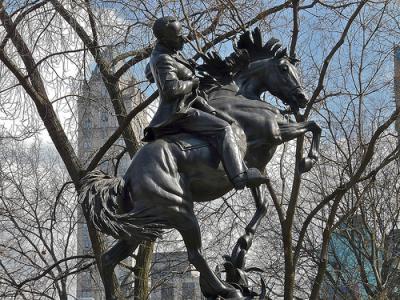 The Norteamericanos extol the poet for his freedom fighting, ignoring his prescience about American imperialism, his recoiling at American racism, and Castro’s anointing of him as a model liberator of the People. It was Martí who introduced his beloved Walt Whitman to readers in South America. There is no statue of Whitman in New York.
The Norteamericanos extol the poet for his freedom fighting, ignoring his prescience about American imperialism, his recoiling at American racism, and Castro’s anointing of him as a model liberator of the People. It was Martí who introduced his beloved Walt Whitman to readers in South America. There is no statue of Whitman in New York.
If the Yanqui-poets’ notions of Martí are blurry, the Cuban poets fare even worse. Longtime exiled poet José Kozer (b. 1940) says, “Every Cuban in his heart of hearts wants to be José Martí. But we lack two things that would be necessary to make this possible: the breadth of language as total knowledge and expression, and an ethical sense of life whose daily character is absolute, demanding of us a maximum of compassionate and spiritual behavior.”
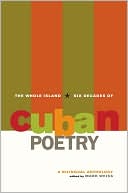 In other words, a Cuban poet may be not only restrained in his/her use of provocative and renewed language, but crippled in “an ethical sense” from adapting to and compromising with the former. This suggests why 11 of the 21 younger poets included in Mark Weiss’ anthology now live abroad. Weiss says that Kozer, perhaps the most influential living Cuban poet, “had been preparing to leave since adolescence … although the expropriation of his father’s business and the family’s subsequent emigration made return unlikely.”
In other words, a Cuban poet may be not only restrained in his/her use of provocative and renewed language, but crippled in “an ethical sense” from adapting to and compromising with the former. This suggests why 11 of the 21 younger poets included in Mark Weiss’ anthology now live abroad. Weiss says that Kozer, perhaps the most influential living Cuban poet, “had been preparing to leave since adolescence … although the expropriation of his father’s business and the family’s subsequent emigration made return unlikely.”
As an anthologist and literary historian, Weiss is highly attuned to “the Cuban poet’s suspension between the external – the political – and the demands of craft and psyche.” This is the grand pleasure of The Whole Island: Six Decades of Cuban Poetry — watching these poets walk the tightrope, a metaphor functioning like code among the poets who picked it up from Eliseo Diego’s poem “The Rope Dancer’s Risks.”
Mark Weiss notes that Cuba’s literary culture is 400 years old “and all the currents of European thought and culture passed through [Havana’s] port.” Martí and Julián del Casal (1863-1893) were the most influential of the Modernismo poets, “the idiosyncratic Latin American adaptation of French Romantic and Symbolist poetry.” Next came the Conversacionalismo poets, and then the Neobarrocos who held that “the poem was to be experienced as a thing in itself, not as a subject for paraphrase,” and thus supposedly more in tune with experience than the narrative-based conversational work — trends contemporaneous with those of European and American poetry.
Eliseo Diego (1920-1994) was a prominent poet among those published in Origenes, the neobarroco-based journal which published 40 issues through 1956. In 1959, he and all the other Origenistas were attacked by the poet Heberto Padilla. Taking samples from them all, Weiss wisely avoids superimposing a political structure on his collection – an approach supporting an overall impression that each poet find his/her best self in the work itself.
Diego died an exile in Mexico City. This is his marvelous poem “Ode to the Young Light,” translated by Weiss:
Light in my country
is much more than time, it lingers
with a strange delight in the military
contours of all things, in the simple
relics of the flood.
Light
in my country resists memory
as gold resists the sweat of avarice,
endures within itself, indifferent to us
in its alien being, its transparency.
Who courts the light with ribbon and drums
bowing here and there with the cunning
of an archaic, incalculable sensuality,
wastes his time, argues with waves
while the rapt light sleeps.
Light, then, is my country doesn’t notice
the sense’s modest victories
nor the delicate disasters of luck,
but dallies among leaves, small birds,
shells, lusters, deepest greens.
Blind, the light in my country dazzles
its own inviolable heart
knowing nothing of profit or loss.
Pure as salt, untouched, upright,
the chaste, demented light strips time of its leaves.
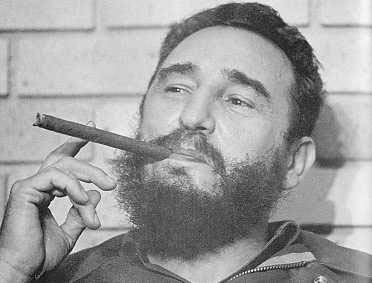 Although all publishing in Cuba is controlled by the state, the state’s literary powers either don’t see a significant threat in most of the new poetry or just don’t care – so long as the poet avoids open dissent and accepts censorship. “The regime has undoubtedly allowed larger areas of freedom to writers in recent years,” writes Weiss. Yet most poets and writers take off, if only because “their standards of living have fallen catastrophically” due to meager earnings from writing.
Although all publishing in Cuba is controlled by the state, the state’s literary powers either don’t see a significant threat in most of the new poetry or just don’t care – so long as the poet avoids open dissent and accepts censorship. “The regime has undoubtedly allowed larger areas of freedom to writers in recent years,” writes Weiss. Yet most poets and writers take off, if only because “their standards of living have fallen catastrophically” due to meager earnings from writing.
Weiss’ selections from poets born after La Revolucíon show that stylistically “they are a very varied group.” But the final lines of “Contributions to a Rudimentary Idea of a Nation” by Omar Perez Lopez (b.1964), who divides his time between Europe and Havana, speak for them all:
Let’s attend the improbable territory
where the Cuban and The Cuban talk man to man,
there we will learn to what crossroads, to what strange places,
to what exchanges
we have committed such cleverness.
*****
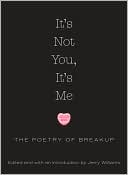 “Poetry is my favorite form of human expression on earth,” says Jerry Williams. “Breakups are my least favorite. So why am I introducing a book that intermingles both splendor and ruin?” Sadly, Williams has been serially jilted over the years, leaving him to suffer through “manias” and “symptoms.” “Subconsciously, I must have been preparing this anthology ever since I was sixteen years old,” he concludes. His selection, he cries, is comprised of “rescue poems” – though in selecting them, he insisted that the work “be non-therapeutic yet transformative.”
“Poetry is my favorite form of human expression on earth,” says Jerry Williams. “Breakups are my least favorite. So why am I introducing a book that intermingles both splendor and ruin?” Sadly, Williams has been serially jilted over the years, leaving him to suffer through “manias” and “symptoms.” “Subconsciously, I must have been preparing this anthology ever since I was sixteen years old,” he concludes. His selection, he cries, is comprised of “rescue poems” – though in selecting them, he insisted that the work “be non-therapeutic yet transformative.”
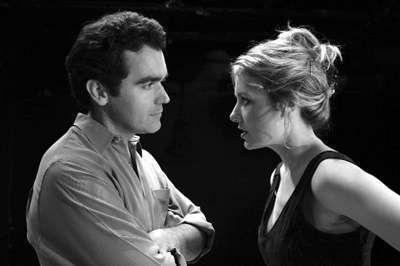 These poems may ease the grief for Williams, since apparently they inspire confidence that one can survive a break-up with verbal integrity. But really, do we read poems like these for consolation? If we do, is it to hear everything-will-be-OK-after-all? Poetry is concerned with finding new language to reveal things as they actually are. Poets write poems for one reason – to make poems, and thus experience the satisfaction of knowing that fine objects may be constructed out of the materials of one’s life.
These poems may ease the grief for Williams, since apparently they inspire confidence that one can survive a break-up with verbal integrity. But really, do we read poems like these for consolation? If we do, is it to hear everything-will-be-OK-after-all? Poetry is concerned with finding new language to reveal things as they actually are. Poets write poems for one reason – to make poems, and thus experience the satisfaction of knowing that fine objects may be constructed out of the materials of one’s life.
For instance, Louise Glück’s Meadowlands, a collection centered on the break-up of a marriage, takes tragic material and treats it comedically in a classic sense, but not because she wants us to feel better about the existence of such things. The triumph is in the making, the dismissal of circumstance, as opposed to having it for dessert. For the poet, the breakup isn’t an occasion for expressing emotion but for stylizing it. The only breakups that hurt are the ones from which the poet finds nothing to pretend into art. Consolation is beside the point.
 Moreover, the poems of It’s Not You, It’s Me prove my perspective, even if William’s introduction points the reader elsewhere. The breakup poem is the poem of a speaker reinstated as solitary. The traits of this collection indicate that a breakup is a conventional thing — all tactics and modes have been tried. Thus, breakups here lead to familiar narrative and lyrics modes. There are no new macro-ideas, but untold numbers of shrewd, witty, charming and strange mini-gestures. Generally, the rhetoric is traditional and the masks are archetypal.
Moreover, the poems of It’s Not You, It’s Me prove my perspective, even if William’s introduction points the reader elsewhere. The breakup poem is the poem of a speaker reinstated as solitary. The traits of this collection indicate that a breakup is a conventional thing — all tactics and modes have been tried. Thus, breakups here lead to familiar narrative and lyrics modes. There are no new macro-ideas, but untold numbers of shrewd, witty, charming and strange mini-gestures. Generally, the rhetoric is traditional and the masks are archetypal.
A MAN ALONE / Steve Orlen
I hated breaking up and I hated
Being left, finding myself in an apartment
With an extra set of silverware and a ghost,
Impatient to be gone. Then to summon up
Who I was before the bed was full with woman.
To shift the street-mind from getting to
To slowing down and window shop. In the bar down the street,
To let me eyes simplify again, and make no judgments,
And breathe in the smoke that drifts
Through one body then another,
And find myself close enough
To whisper into a woman’s just-washed hair
And inhale that ten thousand year old scent.
To memorialize a phone number.
To learn to say goodnight at her door.
To keep my hands in my pockets, like a boy.
To open the heart, only a little at a time.
The breakup facilitates sensibility, just like death. Our desires are unmarried to the world, and the hurt and sorrow in this awareness generate a singular and bitter elation. There is much exulting disguised as grief. Do not console the mourner as he looks upon the deceased, he is not ready for it and may even resent the intrusion. If the purpose of art is not to change but to delight, then the breakup poem doesn’t dispel sadness, it tints it pleasingly.
Williams sorts the content into three sections. “One Foot Out the Door” begins with Robert Hass’ “Privilege of Being” and includes wonderfully familiar work by Tony Hoagland, Alan Shapiro, Kim Addonizio, Kevin Prufer, Mark Strand and others. “In the Middle of the Storm” starts with Stephen Berg’s “Listener” and is accompanied by poems by Michael Ryan, Stephen Dunn, Denis Johnson, Bob Hikok and Patricia Smith. Finally, “The Aftermath” brings more from Addonizio, Mark Halliday, Berg, Jack Gilbert and others. The collection has a bias toward testosterone. Some of the best “get out of my life” poetry has been and is being written by younger females. The women here tend to sound reflective, appropriately wounded – perhaps the way Williams dreams his former girlfriends ought to feel.
Even so, there’s no denying the lovely sound of Addonizio’s “Beginning with His Body and Ending in a Small Town”:
It’s true I can’t forget any part of him,
not the long vein rising up along the underside of his cock,
or the brushy hair around his balls, dank star of the asshole,
high arches of his feet, strawberry mole on his left cheek —
imperfection that made his face exquisite —
and the freckles scattered over his back,
white insides of his wrists, I remember those too,
and the scar on his belly oh I’m kissing it now,
he belongs to me so purely now he’s left me,
he’ll never come back, his face as he lets go inside of me,
I’ll never see it again, I stand dripping
in the shower where I once knelt
before him to drink whatever came
out of him, sometimes he would watch
me as I walked naked around the room,
here I am, it’s the same room, I’m still
seeing his face the night it closed
to me forever like a failed business, iron grillwork
across the door, dirty windows, trash scattered
over the floor and the fixtures taken out, I turned
away and stumbled down the street, the one bar
was open, the saddest bar in the world, filled
with painted clowns and a few drunks, the owner had passed out
in a booth, covered by his coat, his girlfriend was working
and said The usual, right? and I couldn’t say a word
except Please, and I took a stool and drank
what she served and served and served.
[The Whole Island, published November 25, 2009 by the University of California Press, 602 pp., $70.00/$29.95 cloth/paper]
[It’s Not Me, It’s You, published January 14, 2010, by The Overlook Press, 144 pages, $14.95 hardcover]
The Whole Island
Thanks, Ron. Like all books, mine can use all the help it can get.
Best,
Mark